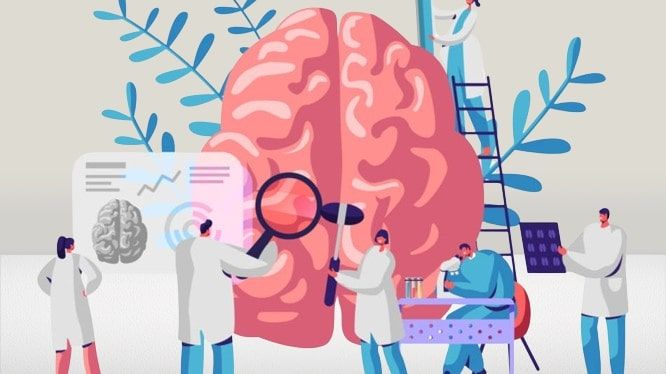Branches of Psychology and Examples

Contents
Psychology has been constantly changing since its inception. Each century has made its own corrections and adjustments to this science. As a result, nowadays psychology exists not only as a separate, independent science, but is also connected with many others, for example, with philosophy, history, sociology and others. Modern psychology has many branches and directions. Let’s consider the most popular branches of psychology, which are actively developing and used at present.
- Acmeology (from ancient Greek – “summit”, ancient Greek logos – “teaching”) is a section of developmental psychology that studies the patterns and mechanisms that ensure the possibility of achieving the highest level of individual development. In a broader sense, it is an interdisciplinary scientific field.
- Differential psychology is a section of psychological science that studies psychological differences, typological differences in psychological manifestations among representatives of various social, class, ethnic, age and other groups. Differential psychology systematizes individual differences and various methods of their diagnostics, and also quantitatively evaluates these differences in various areas.
- General psychology is a section of psychology that generalizes theoretical and experimental psychological research, integrates psychological knowledge, studies the most general psychological patterns, theoretical principles and methods of psychology, its basic concepts and categorical structure in their current state and historical development. The results of research in the field of general psychology are the fundamental basis of all branches of psychological science.
The subject of general psychology is the psyche and mental phenomena of both one specific person and mental phenomena observed in groups and collectives.
- Applied psychology is a general term used to designate all those branches of psychology that seek to apply the principles, discoveries, and theories of psychology in practice in related fields such as education (pedagogy), industry (ergonomics), marketing, public opinion polling, music (musical psychology), sports (sport psychology), personnel management (psychodiagnostics), military affairs (military psychology), etc. and/or to discover basic principles that can be applied in this way.
- Psychogenetics is a science about heredity and variability of mental and psychophysiological properties, which arose at the junction of psychology and genetics. The subject of psychogenetics is the interaction of heredity and environment in the formation of interindividual variability of human psychological properties (cognitive and motor functions, temperament).
- Psychodiagnostics is a branch of psychology that develops the theory, principles and tools for assessing and measuring individual psychological characteristics of a person. The term psychodiagnostics appeared in 1921 and belongs to the Swiss psychologist Hermann Rorschach (1874-1922).
- Personality psychology is a section of psychology that studies personality and various individual processes. The emphasis is on trying to create a coherent picture of personality in its relationships with the world, life, society, and others. In addition, the dynamic aspects of mental life and individual differences are studied.
- Developmental psychology is a branch of psychology that studies psychological changes in humans as they grow older. Developmental psychology consists of three subbranches: gerontopsychology, child psychology, pre- and perinatal psychology. It studies the psyche and the human body at all ages and stages, taking into account the biological, anthropological, sociological and psychological factors that influence its development.
- Social psychology is a section of psychology that studies human relationships, phenomena that arise in the process of communication and interaction of people with each other in groups, in particular in the family, at school, in teams. Such knowledge is necessary for the psychologically correct organization of education and the relationship between the individual and the team.
- Gender psychology is a section of differential psychology that studies patterns of human behavior in society, determined by their biological sex, social sex (gender) and their relationship. Gender studies of social psychology study such phenomena as: socialization, prejudice, discrimination, social perception and self-perception, self-esteem, the emergence of social norms and roles.
- Child psychology is a branch of psychology that studies the facts and patterns of a child’s mental development. The subject of child psychology is the study of the conditions and driving forces of the ontogenesis of the human psyche, the development of individual mental processes (cognitive, volitional, emotional), as well as various types of children’s activities (games, work, learning), the formation of personality traits, age-related and individual psychological characteristics of children.
- Engineering psychology is a branch of psychology that studies the processes and means of information interaction between humans and machines, as well as technical means of automation. Its most important components are the processes of perception and processing of operational information, decision-making in conditions of limited time.
Psychophysiological method of prevention, for example, in case of an accident. The novelty of the development is the creation of the possibility of activating the driver’s attention while driving a car.
- Clinical psychology is a section of psychology (at the junction with psychiatry) that studies mental phenomena from the point of view of their relationship with diseases. The field of clinical psychology includes diagnostics of mental health, organization and conduct of scientific research to understand psychophysiological problems and development, implementation and evaluation of psychological correction (psychotherapy).
Psychotherapeutic methods of clinical psychology: counseling, individual psychotherapy, family psychotherapy, family counseling and various forms of support for people experiencing psychological problems associated with physical health disorders.
- Educational psychology is a section of psychology that studies methods of teaching and upbringing that increase the effectiveness of the implementation of educational tasks, the effectiveness of pedagogical measures, improve the psychological aspects of teaching, etc. The subject of educational psychology is the facts, mechanisms and patterns of mastering socio-cultural experience by a person, the patterns of intellectual and personal development of a child as a subject of educational activity, organized and managed by a teacher in different conditions of the educational process.
The structure of educational psychology: psychology of learning; psychology of education; psychology of the teacher.
- The psychology of art is called upon to establish the most general patterns of all types of artistic activity, to reveal the mechanisms of the formation of the personality of a creative person, and to analyze the various forms of the influence of art on a person.
- Psychology of parenting is a field of psychology aimed at studying parenting as a psychological phenomenon. From a psychological point of view, parenting is considered as part of the personality of the father and mother. The features of its development during life are studied (as a value, as a factor influencing behavior and the emotional sphere, etc.); conditions that can negatively and positively influence this development. Methods are developed to provide psychological assistance to parents at different stages of life (including post-parenthood – the period when children no longer need parental care).
- Labor psychology is a section of psychology that studies psychological processes, states and patterns of human mental functioning associated with labor activity.
- Management psychology is a section of psychology that studies the psychological patterns of management activity. The main task of management psychology is to analyze the psychological conditions and characteristics of management activity in order to improve the efficiency and quality of work in the management system. The management process is implemented in the activities of the manager, in which management psychology highlights the following points: diagnostics and forecasting of the state and changes in the management subsystem; formation of a program of activities of subordinates aimed at changing the states of the managed object in a given direction; organization of decision execution. In the personality of the manager, management psychology distinguishes his management needs and abilities, as well as his individual management concept, including the super-task, problem content, management plans and internally accepted principles and rules of management by the individual. The management subsystem studied by management psychology is usually represented by the joint activity of a large group of hierarchically interconnected managers.
The practical implementation of developments in the field of Management Psychology is carried out in the form of creating diagnostic tools, developing active methods for training managers, management consulting, in particular, on issues of professional development, creating a reserve for promotion to management positions, etc.
- Legal psychology is a section of psychology whose subject is the psychological characteristics of activities related to law: the administration of justice (the behavior of participants in criminal proceedings), lawful and unlawful behavior (the formation of the personality of a criminal and the characteristics of criminal behavior), the work of law enforcement officers and other legal services.
- Space psychology is a branch of psychology that studies the psychological characteristics of astronaut work, the dependence of these characteristics on a number of specific factors (weightlessness, physical inactivity, relative sensory deprivation, etc.), as well as methods and techniques for the purposeful organization of the astronaut’s mental activity during the preparation and implementation of space flights.
- Logopsychology is a branch of special psychology that studies the psychological characteristics of individuals with various speech disorders.
Logopsychology studies the causes, mechanisms, symptoms, structure of disorders in the cognitive, emotional-volitional spheres, as well as interpersonal relationships of children with speech development disorders.
The object of study is determined by the fact that with various speech disorders, various features of the mental process, states and properties are observed, which must be taken into account in correctional and psychological-pedagogical work.
- Oligophrenopsychology is a branch of psychological knowledge that studies mentally retarded people. Its main tasks are: The most complete, multifaceted study of mentally retarded children, their characteristics. Detailed development of methods and means of early diagnosis of mental retardation, as well as psychocorrection at the initial and later stages of this process. Development of basic principles of educational and upbringing work with mentally retarded children, facilitating the creation of special institutions for them (auxiliary kindergartens and schools).
- Organizational psychology or management psychology is a branch of psychology that aims to apply psychological theories and research methods to organizational, management, and business problems. The ultimate goal of applying organizational psychology is to improve productivity and job satisfaction in various organizations.
- Pathopsychology is a practical branch of clinical psychology that “studies disorders of mental processes and states using psychological methods, analyzing pathological changes “based on comparison with the nature of the formation and course of mental processes, states and personality traits in the norm.”
Pathopsychology is a branch of clinical (medical) psychology, the subject of which is psychopathology, and the task is psychodiagnostics with the aim of clarifying a medical diagnosis and justifying treatment, in particular psychotherapy and occupational therapy.
- Health psychology is a set of specific educational, scientific and professional contributions of psychological disciplines to the dissemination and maintenance of health, treatment and prevention of diseases.
- Psychosomatics (from the ancient Greek ψυχή — soul and σῶμα — body) is a direction in medicine (psychosomatic medicine) and psychology that studies the influence of psychological factors on the occurrence and course of somatic (physical) diseases.
Within the framework of psychosomatics, the connections between personality characteristics (constitutional features, character and personality traits, behavioral styles, types of emotional conflicts) and one or another somatic disease have been and are being studied.
- Psychotherapy (from ancient Greek ψυχή — “soul”, “spirit” + θεραπεία — “treatment”, “healing”, “medicine”) is a system of therapeutic influence on the psyche and through the psyche on the human body. It is often defined as an activity aimed at ridding a person of various problems (emotional, personal, social, etc.). It is usually carried out by a specialist psychotherapist by establishing deep personal contact with the patient (often through conversations and discussions), as well as using various cognitive, behavioral, medicinal and other methods. However, this definition is not complete.
The concept of psychotherapy should be distinguished from both psychiatry and psychology.










